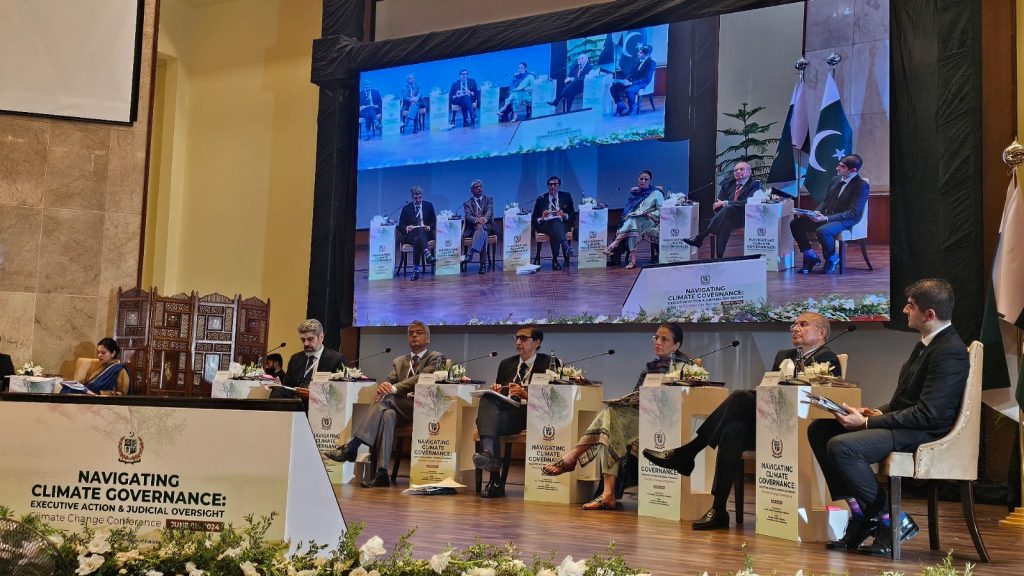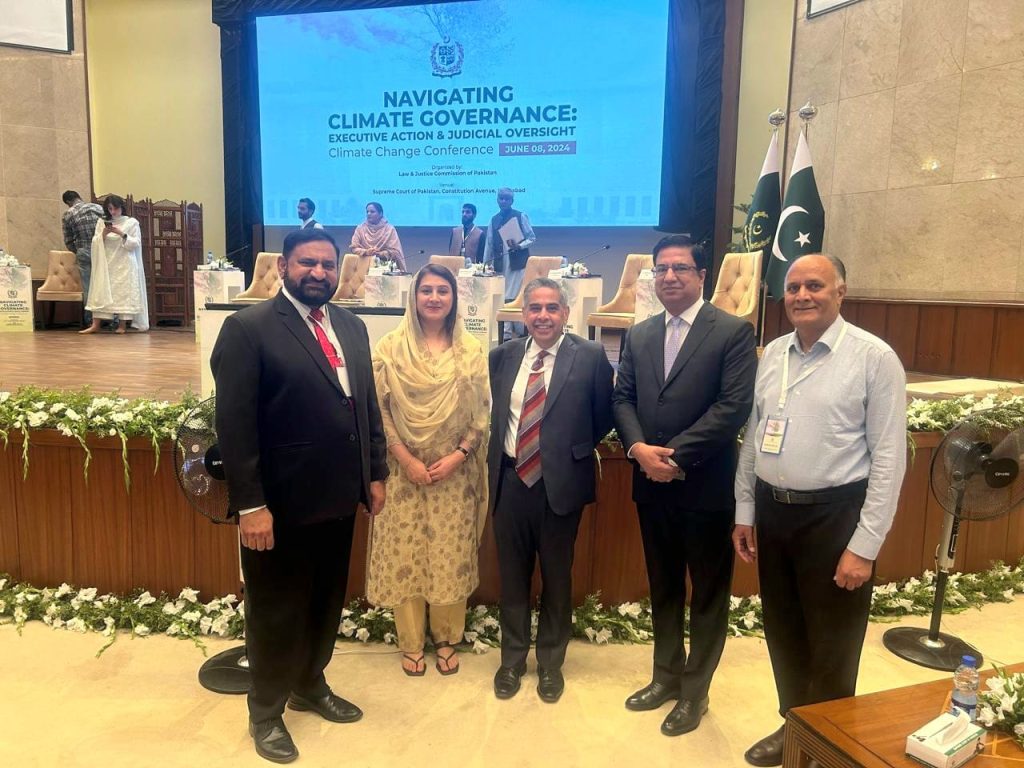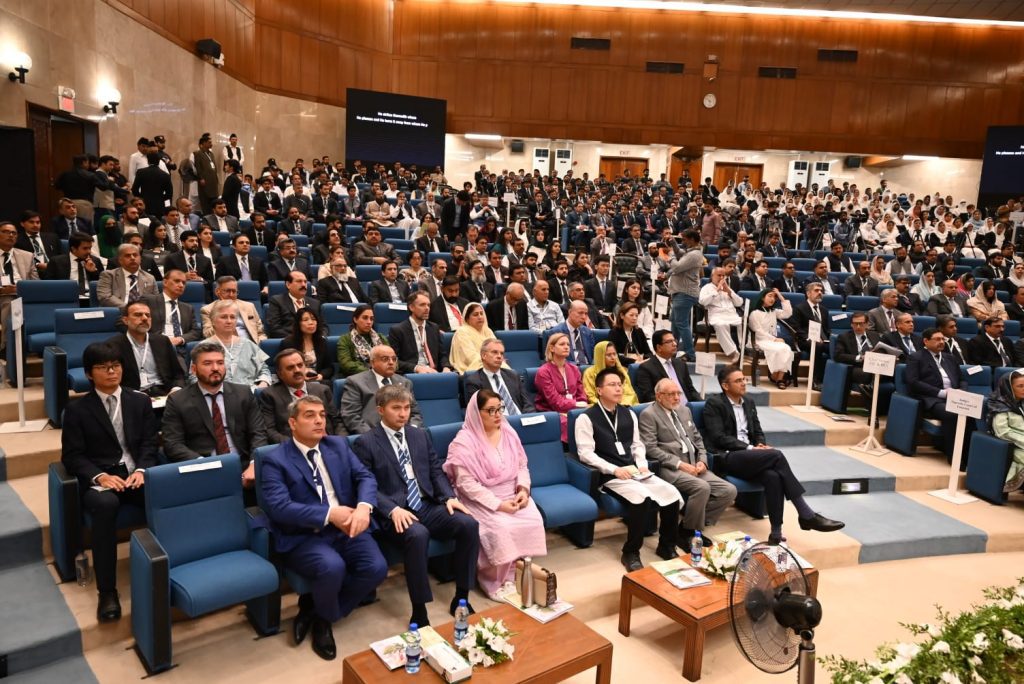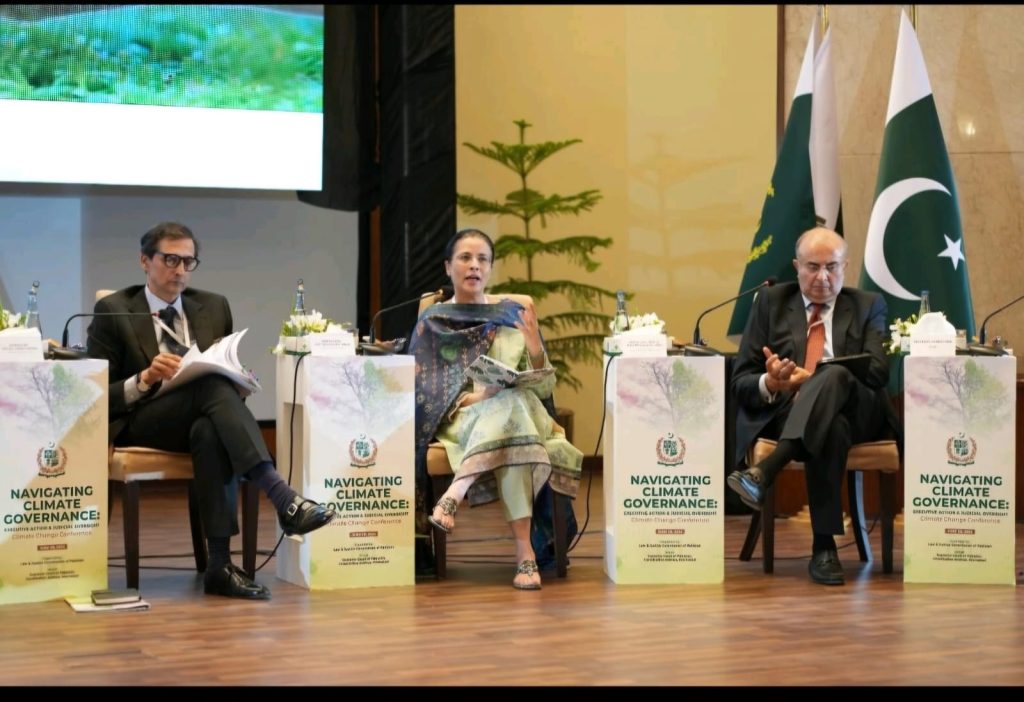Law and Justice Commission of Pakistan (LJC) Organized Conference on Climate Change

The one-day conference on climate change, titled “Navigating Climate Governance, Executive Action, and Judicial Oversight,” organized by the Law and Justice Commission of Pakistan in the Supreme Court, committed to addressing the multifaceted challenges posed by climate change, aiming to explore and strengthen the roles of executive action and judicial oversight in mitigating climate impacts and collective efforts towards environmental sustainability and global climate governance.
Chief Justice of Pakistan Justice Qazi Faez Isa was the Chief Guest, and the conference saw participation from judges of the superior judiciary, members of the bar, jurists, researchers, academia, experts, and other stakeholders. In his remarks, Chief Justice of Pakistan (CJP) Qazi Faez Isa highlighted the urgent need for adopting eco-friendly measures and promoting a healthy lifestyle to tackle the prevailing climate crisis. His suggestion to provide bicycles to all judges is a practical approach to reducing carbon emissions and promoting sustainable transportation methods, drawing parallels with global practices in countries like the Netherlands and Denmark.
This conference is significantly important, inspired by Azerbaijan hosting COP29 in November 2024 and provides an opportunity to raise awareness about climate change issues, reinforcing Azerbaijan’s dedication to sustainable development and the creation of resilient communities across Pakistan. COP29 is a crucial step in our efforts to maintain greenhouse gas emissions at levels that meet international standards for a clean environment and green growth. National institutions must adopt policies focusing on climate change, proving instrumental in fostering regional cooperation.
The first panel discussion delved into the diverse geographical and meteorological challenges faced by Pakistan, including glacial lake outburst flooding, droughts, crop failures, and urban heat-waves. The panelists stressed the need for decisive government leadership and proactive adaptation measures. The second panel focused on the division of responsibilities between federal and provincial bodies after the 18th Amendment, emphasizing localized action and strengthening local governments for effective climate governance. The final panel discussion on “Courting Climate Change” explored the judiciary’s role in climate governance and the limitations of executive action. The panelists emphasized the need for localized action, effective mapping of vulnerabilities, and strengthening local governments.
About Law and Justice Commission of Pakistan (LJCP)
The Law and Justice Commission of Pakistan (LJCP) was established in 1979 with the Chief Justice of Pakistan as head of its Board of Governors. Its primary objectives include reviewing legislative instruments, codifying laws, removing inconsistencies in federal and provincial legislation, promoting legal literacy and awareness programs, initiating reforms in the administration of justice to ensure substantive, inexpensive, and speedy justice, and enhancing coordination between the judiciary and executive. LJCP is an ideal forum to initiate debate on climate change and to promote the three tenets of climate justice: distributive, procedural, and recognition of diversity. The LJCP has taken significant steps towards fostering the necessary conversations for the survival, security, and healthy lives of the people. The LJCP strives to foster a culture of coordination and collaboration, ensuring a united and effective response to climate challenges.
Highlights from the Conference
Secretary of the of the Ministry of Climate Change and Environmental Coordination, Eazaz Dar, in his welcome remarks, emphasized that climate change impacts all forms of life and highlighted the importance of coordination, cooperation, and collective responsibility to combat climate change effectively. He pointed out that no government could handle the situation alone without the vibrant participation of society, the judiciary, and all other strata of society. Governance and institutional challenges, along with capacity constraints to tap climate finance, were identified as serious hurdles to the country’s climate resilience. Pakistan, with its limited resources, has been active in international bodies such as the Green Climate Fund (GCF) and the Loss and Damage Fund, but faces challenges in accessing and effectively utilizing these funds due to bureaucratic red tape.
Hammad Naqi Khan, Director General of the World Wide Fund for Nature (WWF-Pakistan), emphasized the agreed phenomenon of climate finance and the hollow commitments made under global climate funds. He highlighted the bureaucratic hurdles within the GCF and called for resolving these issues to ensure the smooth rollout of climate investments intended to enhance the country’s climate resilience. Muhammad Idrees Mahsud, Member Disaster Risk Reduction, National Disaster Management Authority (NDMA), noted the drastic changes in the country’s weather cycles due to global warming and stressed the need to strengthen district disaster management authorities amid rising climate crises.
Attorney General Mansoor Awan discussed the Climate Change Act enacted in 2017, which took seven years to lead to the establishment of the Climate Change Authority by court order. He emphasized the need for strong local governments to enhance climate resilience, as the Climate Change Authority is the only executive body where the Prime Minister and provincial governments sit together with a holistic approach.

H.E. Khazar Farhadov, Ambassador of the Republic of Azerbaijan to Pakistan, discussed Azerbaijan’s preparations for COP29 to promote global solidarity and unity in addressing the challenges of climate change. The ambassador said that the COP29 will be a force for good, connecting North, South, East, and West and mobilizing the international community to make progress on halting global warming. The COP29 Presidency is also working with a wide range of actors, from multilateral financial institutions, the private sector, the financial services industry, and philanthropy, to unlock climate finance and deliver the multiples we need.
Dr. Abid Qaiyum Suleri, Executive Director of the Sustainable Development Policy Institute (SDPI), noted that the country’s climate agenda is based on climate policy and institutions. He stressed that climate change is not only a federal but also a provincial issue, affecting sectors such as agriculture, food, irrigation, forestry, and wildlife. He called for the development of independent and financially strengthened authorities like the Climate Change Authority to ensure strong implementation of the climate agenda.
Former Interim Climate Change Minister Ahmed Irfan Aslam identified water as the most visible manifestation of climate change, pointing out issues like inadequate water storage and significant groundwater depletion. He stressed the need for addressing these issues at the provincial level, where financial and capacity constraints hinder the development of localized storage facilities and efficient canal systems.
Justice Mansoor Ali Shah linked climate justice with human rights, emphasizing the need to protect the most vulnerable people and share the burdens of climate change equitably. He highlighted the role of the judiciary in mainstreaming climate change cases and ensuring that environmental laws are upheld. Justice Ayesha A. Malik concluded with a call for crafting solutions that protect the planet and its people, while Justice Jawad Hasan stressed the judiciary’s role in providing a secure environment for climate finance.
Ms. Riffat Inam Butt, Secretary of the Law and Justice Commission of Pakistan, delivered the vote of thanks, underscoring the conference’s significance in marking a step forward in Pakistan’s efforts to address climate change through coordinated executive action and judicial oversight.
Pakistan’s Judiciary Role in the Climate Framework
- Pakistan Judiciary Role in Climate Framework Commencing as a public interest litigation via a writ petition filed in 2018 under the auspices of Article 184(3) of the Constitution, this initiative has resulted in the establishment of various judicial commissions, making substantive strides in promoting environmental justice. Environmental safeguarding aligns closely with numerous UN Sustainable Development Goals (SDGs) to which Pakistan has pledged its commitment. Specifically, the rights to an unpolluted and flourishing environment, access to potable water, and a climate conducive to human sustenance have been extrapolated from the fundamental right to life (Article 9) and the right to dignity (Article 14).
- Judicial interpretations of these constitutional provisions have acknowledged that healthful environment is indispensable for the preservation and enhancement of life itself, recognizing that the right to life encompasses not only freedom from physical harm but also the entitlement to a dignified and flourishing existence. In the landmark case of Shehla Zia versus WAPDA (Federation of Pakistan (PLD) 1994 Supreme Court 693), the Supreme Court grappled with the profound inquiry of whether an individual’s dignity could remain intact when their right to life is stripped of its essential requisites, encompass not only the rudimentary elements of existence but also encompass adequate provisions for sustenance, attire, habitation, education, healthcare, a pristine atmosphere, and an unblemished environment.
- The court expounded, “The term ‘life’ within the constitutional framework is not to be confined within narrow confines. It is incumbent upon us to ascribe a comprehensive significance, affording an individual not merely the means to subsist, but to luxuriate in the fullness of existence.” The Khewra Mines case (1994 SCMR 2061) delved into the critical discourse surrounding water access and pollution, emphasizing the paramount significance of this matter concerning the right to life.
- Within this legal context, the Supreme Court explicitly recognized that in situations where access to water is scant, arduous, or curtailed, the entitlement to pristine and uncontaminated water becomes intricately interwoven with the very essence of the right to life itself. In the case of Imrana Tiwana vs Province of Punjab (PLD 2015 Lahore 522), the Lahore High Court (LHC) expounded upon the concept of safeguarding the environment as an “inalienable right,” positing its potential primacy over other constitutional rights.
- Moreover, it underscored the intricate intertwining of fundamental rights to life, liberty, and human dignity with the imperative of environmental preservation. In the face of Pakistan’s marginal contribution to global warming, it confronts an exaggerated vulnerability to the repercussions of climate change. Within the set legal precedent of the Asghar Leghari v Federation of Pakistan (2018 CLD 424), the Supreme Court discerned the exigency for immediate deployment of adaptation measures to counteract the disruptive patterns induced by climate change.
- The Supreme Court censured the government’s lethargy in executing the Framework for Implementation of Climate Change Policy (2014-2030), underscoring that this omission encroaches upon the fundamental rights of citizens that demand safeguarding. In the more recent case of D.G. Khan Cement Company Ltd versus the Government of Punjab (2021 SCMR 834), the Supreme Court explicitly prohibited the establishment and expansion of cement plants in environmentally fragile zones.
Conclusion
The Climate Justice and Governance Conference is a significant milestone in Pakistan’s journey towards addressing climate change through coordinated executive action and judicial oversight. The discussions and proposals presented at the conference reflect a comprehensive approach to tackling climate challenges, emphasizing the integration of sustainable practices, robust governance, and active judicial engagement.
The conference advocated for a human-centered approach to climate justice that ensures equitable sharing of climate change burdens and benefits, reinforcing Pakistan’s commitment to global climate governance, and emphasized the importance of climate finance, strong local governance, and effective judicial oversight to ensure environmental laws are upheld and that the most vulnerable communities receive the support and justice they need. Pakistan’s judiciary role in promoting sustainable practices and setting legal precedents to discourage harmful environmental actions is a significant step forward in Pakistan’s climate governance efforts.





